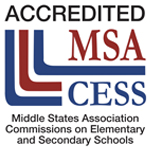
There’s no doubt about it: good people make a good school.
In the case of private schools, teachers and faculty are the backbones of an institution; and research shows that private schools are much more likely to find (and hold onto) the best hires the education sector has to offer.
First and foremost: private schools are at liberty to hire the right teacher for the job, regardless of state-mandated testing and licensing.
A great teacher can be found outside the box – and private schools have the freedom to hire that candidate and give them the opportunity in the classroom that a public school cannot.
Teachers | Various Studies
Additionally, several studies (including a 1991 University of Illinois study and the 1987 work of D.E. Mitchell, F.I. Ortiz, and T.K. Mitchell) have proven a link between teachers’ perception of an institution’s professional atmosphere and their job satisfaction/effectiveness.
These studies have found that when teachers view the environment as more professional and less haphazard, they are better at (and more satisfied with) their jobs. Private schools, with an emphasis on professionalism, encourage this type of environment and thus bring out the best in both students and teachers.

A 1995 study by F. Newmann and G. Wehlage for the Wisconsin Center for Education Research found that high school students achieve excellence best in a community of learners that is collaborative and professional.
Because private schools can keep class and institution size down, they can encourage teacher commitment to the values of academic excellence as well as allow those great hires to blossom into wonderful teachers. This study also found that teachers are better at communicating consistent goals to students as well as collaborating to effectively raise student achievement when they feel a sense of school community.
Teachers Community
This community spirit is an essential value in the private education system, and one that private schools can foster much more efficiently than public schools. This in turn creates a better environment for student learning, as well as effective teaching.
A 2002 study by the National Center for Education Statistics found that private school teachers are more likely than their public school colleagues to report having a great deal of influence on teaching practices as well as school policies. This makes teachers at a private school feel more comfortable in their work environment. They have more autonomy in the classroom and feel heard by administrators when they raise complaints “from the trenches”. It also encourages a deeper connection to the school’s community, which means a lower turnover rate and more continuity in students’ education.
A 1988 study by A.S Bryk and M.E. Driscoll found that teachers working toward the same shared goals have an intense influence on academic achievement. Teachers in such an environment experience greater job satisfaction and lower absentee rates. Both of these factors are directly corollary to student learning and stem from a fostered sense of community and collaboration amongst faculty.
Private school, better able to cultivate such community and collaboration, also creates the best environment for good teachers to do what they do best.
Sources:
- https://nces.ed.gov/pubs2002/2002013.pdf
- https://nces.ed.gov/fastfacts/display.asp?id=28
- https://nces.ed.gov/programs/digest/d13/tables/dt13_211.10.asp





